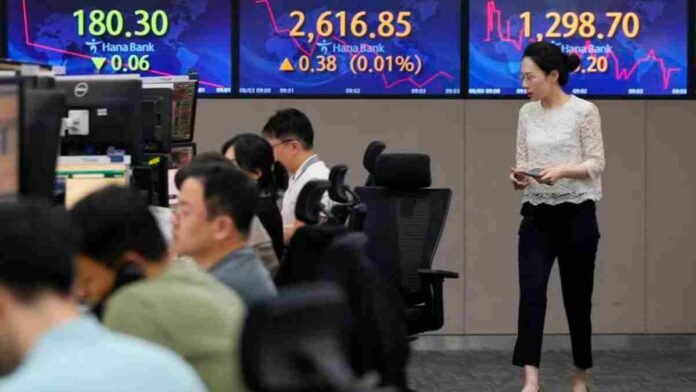Stock market today: Stock markets in Asia were mixed on August 3, Thursday, after Fitch Ratings lowered the US government’s credit rating.
Tokyo’s market benchmark dropped over 1%. Hong Kong and Shanghai gained. Higher oil prices.
Wall Street dropped the most in months Wednesday after Fitch Ratings lowered the U.S. credit rating. After Congress pulled Washington near to default, the agency cited rising debt and “steady deterioration in standards of governance” to justify expanding its borrowing limit.
“This is largely irrelevant despite some initial shock,” said Kristina Hooper of Invesco in a research, adding that this puts the U.S. ranking more commensurate with other big economies. “The timing was odd since it occurred well after the debt ceiling issue was resolved.”
Tokyo’s Nikkei 225 fell 1.3% to 32,293.33, while Shanghai’s Composite Index advanced 0.4% to 3,273.68. At 19,636.34, Hong Kong’s Hang Seng gained 0.6%.
Sydney’s S&P-ASX 200 down 0.7% to 7,300.50, while Seoul’s Kospi fell 0.5% to 2,604.89.
India’s Sensex began 0.2% lower at 65,666.36. New Zealand and Southeast Asian markets fell while Jakarta rose.
The S&P 500 fell 1.4% to 4,513.39 on Wednesday after Fitch downgraded U.S. government debt from AAA to AA+. After last week’s 16-month high, the benchmark lost again.
35,282.52 was the Dow Jones Industrial Average’s 1% decline. At 13,973.45, the Nasdaq composite slid 2.2%.
The Fitch rating hits the global financial system because U.S. Treasurys are secure assets. Congress’s recurrent standoffs over whether to default were mentioned by the agency.
Standard & Poor’s downgraded U.S. According to the GAO, the budget standoff raised borrowing costs by $1.3 billion that year.
Investors are wondering if the U.S. can avoid a recession after numerous interest rate hikes to curb inflation.
Trader optimism lifted the S&P 500 19.5% in the first seven months.
Even while private sector hiring decreased in July, payroll processor ADP said Wednesday that it was greater than projected. Strong hiring may reduce recession worries but possibly convince the Federal Reserve that prices are rising too fast.
The U.S. government will release a more detailed jobs report Friday. Fed Chair Jerome Powell has said Friday’s statistics will heavily impact the central bank’s September action.
On Wall Street, Microsoft, Nvidia, and Amazon dropped more than 2.5%.
Generac Holdings, which sells generators and other power supplies, fell 24.4%, the greatest decline in the S&P 500, after reporting lower profits than expected. After disappointing earnings and revenue growth, SolarEdge Technologies fell 18.4%. It stated increased interest rates pressure U.S. home customers.
Other corporations are surpassing earnings projections.
After reporting a smaller loss than expected, CVS Health climbed 3.3%. After beating forecasts, Humana rose 5.6%.
Benchmark U.S. crude rose 13 cents to $79.62 a barrel in electronic trading on the New York Mercantile Exchange. Yesterday, the contract sank $1.88 to $79.49. Brent crude, the international oil trade benchmark, rose 17 cents to $83.37 per barrel in London. It fell $1.71 to $83.20 the prior session.
The dollar increased to 143.72 yen from Wednesday’s 143.28. From $1.0943, the euro fell to $1.0931.



